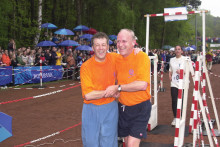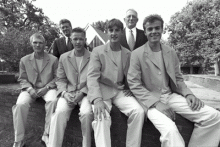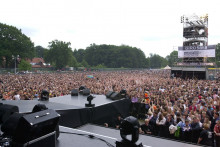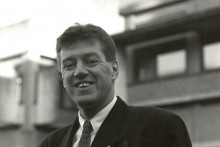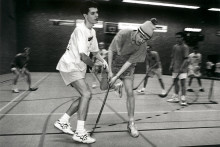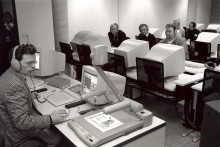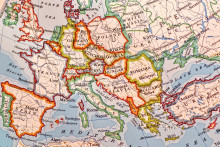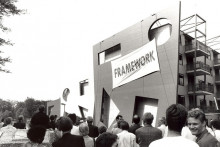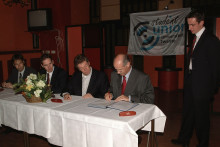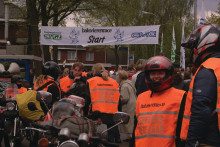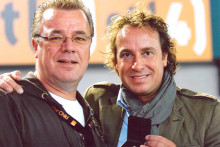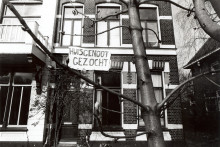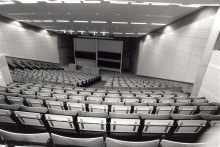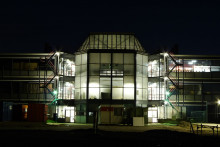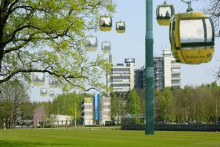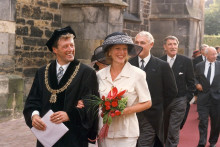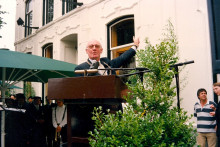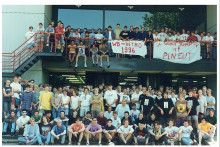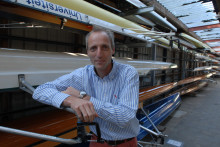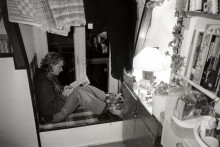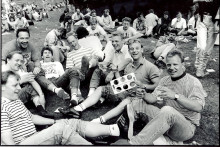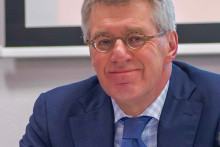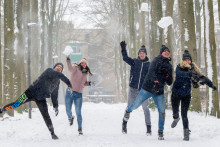As professor of public administration and scientific director of CHEPS (Centre for Higher Education Policy Studies), Frans van Vught (70) had spent many years researching universities, before he became the head of one himself in 1997. Now, more than twenty years later, he looks back on his time as Rector Magnificus of the UT. Van Vught peppers bits of scientific knowledge regarding higher education between his personal anecdotes. ‘Did you know that in the US, they did research into the average term of office for university administrators? It turned out to be exactly 5.6 years.'
Van Vught was a UT board member for eight years. In his second term, he even held a dual post as both Rector Magnificus and President of the Executive Board. When Van Vught started his job in 1997, he encountered an 'out-of-touch' university. The UT was struggling with declining student numbers, old-fashioned education and fragmented research efforts. 'In short, there was work to be done.’

'La grande bouffe' (feast) during the introduction period in 1998.
It was his job to shake things up significantly, and that is precisely what he did. Over the following years, many saw the rector as a standard-bearer, someone who was spearheading innovation. Others, however, felt he was moving way too fast and tried to hit the brakes. ‘It's true, we were moving fast,’ says the former rector. ‘We were hard at work trying to achieve innovation.’
'My dream vision was a university with five faculties and five institutes with space and power of expression'
Reduce and unify
Van Vught provides an outline of the situation he encountered. ‘Just before I started, the UT scored nothing at all in terms of the so-called 'in-depth strategy', with which science funder NWO aimed to stimulate Dutch research. Delft and Eindhoven, conversely, got very high marks as technical universities. As such, the mood here in Twente regarding the university's own research was quite despondent. The UT was too inconspicuous and barely visible.’
Van Vught believes the problem lay in the university's considerable fragmentation. When he began, the university had no fewer than ten faculties. The UT was an insular organisation, and the various 'islands' barely worked together. ‘My dream vision was a university with five faculties and five institutes with space and power of expression. The motto was therefore: reduce and unify.’
A fine example of this ‘reducing and unifying’ is the establishment of the research institute MESA+ (‘rather a feat’). ‘It was a huge gamble, which sometimes kept me awake at night, because what did I know about nanotechnology? It also involved a fifty-million-euro investment. Fortunately, it turned out well. MESA+ became a success.’

During an information day (1996).
Profile Frans van Vught
Van Vught graduated from Utrecht University and spent several years working as a researcher at various American universities. He obtained his doctorate at the UT in 1982, and four years later, he was appointed Professor of Public Administration here. In addition, he headed the UT Institute CHEPS from 1985 to 1997, and was Dean of Public Administration from 1990 to 1994. Van Vught was Rector Magnificus from 1997 to 2005 and also President of the Executive Board from 2001 to 2005. After Twente, he moved to Brussels where, among other things, he became an advisor to the President of the European Commission.
'Looking back, founding the Student Union was a fantastic adventure'
Student Union
Research was not the only thing that was fragmented when Van Vught took office: student life also took place on various small campus islands. ‘There were an awful lot of clubs and associations,’ the former rector recalls. ‘Each with their own little drinking room hidden in a cellar somewhere. Furthermore, UT students were rather pampered in those years. Campus life was bureaucratically controlled by a campus director. Not much was allowed, there were closing times, and students had to apply for permits for all kinds of things. I found that very unappealing. I felt that as a campus, or rather as a university community, we should be able to do better than that.’
Let the students organise things themselves, Van Vught thought. As a researcher in the United States in the 1980s, Van Vught had seen how American students in a 'student union' managed their campus themselves, down to having their own budget and staff. ‘Along with a group of UT students, I visited the UK, where they are also familiar with the phenomenon of a student union. We picked up plenty of tips and tricks there and, not long after that, the first Student Union was founded in Twente.’
‘As rector, I considered contact with students very important. They are the foundation of the academic community. During my first month, I began hosting 'breakfast with the rector’, which continued until my last month as rector. For me, this was my main way of keeping in touch with the students and finding out what was on their minds. When I left, I was totally surprised by a special programme that the students organized. Totally surprised and very touched. Looking back, founding the Student Union was a fantastic adventure. I really see it as my flagship achievement.’

Breakfast with the rector (1997).
Twente the medicine
Another flagship is the technical medicine degree programme. Twente had always wanted to set up a medical faculty, but had never achieved this aim. In the late 1990s, standard-bearer Van Vught made a new attempt. The Twente rector raised the matter with the then Minister of Education Loek Hermans. ‘I knew him a little. He felt that the plan had potential, but also said that it would not work with a regular medical programme. So Loek said: ‘Come up with something innovative. You're good at that in Twente, aren't you?’
Together with Heleen Miedema, Van Vught came up with the answer: a new degree programme in technical medicine. ‘Something like that did exist in the US, but it was completely new to the Netherlands. The existing medical faculties were dead against it. That led to quite a conflict, and it sometimes felt as though we were fighting a losing battle, but we managed in the end. From then on, the UT had a third leg besides technical and social sciences: biomedical sciences.’
'For me, managing the UT was a highlight of my life'
Major/Minor
The psychology, business sciences and biomedical technology programmes also saw the light of day during those years. Another one of Van Vught's important achievement is the introduction of the major/minor system. Once again, he drew on the time he spent in the US for this idea. As a researcher overseas, he saw how students received a broad education by taking subjects from different fields, i.e. minors. In the Netherlands however, in the late 1990s, the university world was a 'highly specialized degree factory', says Van Vught. ‘While students benefit much more from a broad base; studies have shown as much.’
The major/minor system aimed to change that, says Van Vught, but it was not introduced without a fight. ‘It meant that degree programmes lost part of their autonomy, which some saw as an infringement. Fortunately, there was also enough support for the plan and we were able to implement it. That's how the major/minor was born in Twente. Every university in the Netherlands now has a similar system.’

Benefit concert after the fireworks disaster in 2000.
Siem Sigerius
During Frans van Vught's rectorship, future author Peter Buwalda worked as a journalist for UT-Nieuws (the predecessor of U-Today). When the two met for the first time, it turned out they shared a liking for American author Philip Roth. ‘We had heated debates about this at the campus pub,’ recalls Van Vught.
Years later, when Buwalda was working on his first novel Bonita Avenue, he interviewed Van Vught several times about his time as rector of the UT. According to the author, the former rector of the UT represents twenty percent of the main character in Bonita Avenue: Siem Sigerius, rector of Tubantia University. There are many familiar scenes in the book, says Van Vught. ‘Including some about me. When I'm asked to speak somewhere I sometimes introduce myself as Siem. Sigerius. Usually half of the audience doesn't have a clue what I'm talking about, while the other half laughs, meaning they've probably read Buwalda's book,’ he chuckles.
Turbulent
The five new faculties and institutes, the major/minor system and a trio of new programmes: Van Vught has left his mark on the UT. Not to mention the turning point in terms of research, the convergence of the technical universities in the 3TU (later 4TU) and the start of ECIU. ‘I didn't just mind the shop,’ concludes Van Vught. ‘I don’t like to boast, but the UT was in good shape by the time I left in January 2005. The university was growing and there was more financial breathing space.’
‘When, after eight years, I was asked to stay on for a third term, I was very hesitant,’ says Van Vught. ‘I eventually decided not to. I told you what colleagues in the US said,’ he laughs. ‘5.6 years is the max for a university administrator. And I'd already been there on my post a while longer. There comes a time when the magic has gone. There was nothing that I still wanted to do. But I look back on it with great satisfaction and gratitude. For me, managing the UT was a highlight of my life.’


